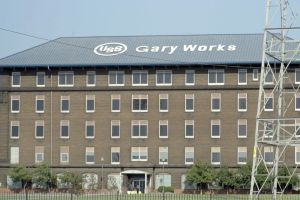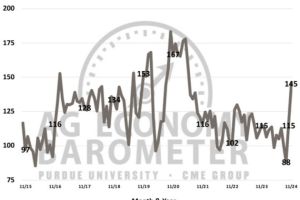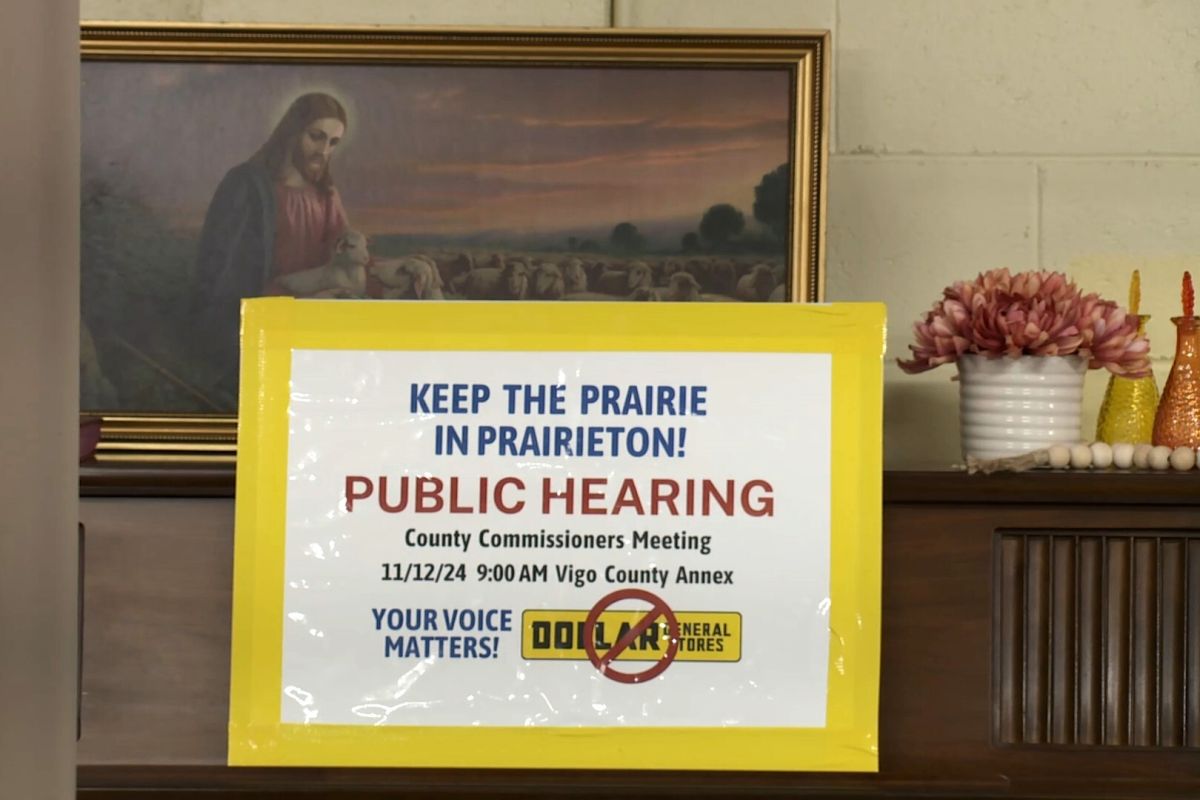
A sign in the basement of the Prairieton United Methodist Church. (Clayton Baumgarth/WTIU News)
In the basement of Prairieton United Methodist Church, 40 residents of the town gathered to voice their concerns about a proposed Dollar General Store in their community.
They were waiting for a representative from the company to answer those concerns.
“It's just the whole idea, you know, we're not against change, we're not against business, if you want to open a nice little coffee shop and bookstore, but Dollar General just isn't quite a good fit,” said Cindy Morgan, a member of the church and one of the leaders of the ‘Keep the Prairie in Prairieton’ group.
It’s an example of what has played out in several Indiana towns, pushing back on new dollar stores.
The Prairieton grassroots protest group began when residents spotted signs from Vigo County officials inviting community members to attend a planning commission meeting.
The goal was to rezone a parcel of private, agricultural land directly next to the Prairieton United Methodist Church into commercial property.
“Somebody saw it there on [County Road] 63 where they're going to put the site, and it just kind of blew up on Facebook,” Morgan said. “What is this? It was Dollar General.”
Read more: Prairieton community speaks out against new Dollar General location
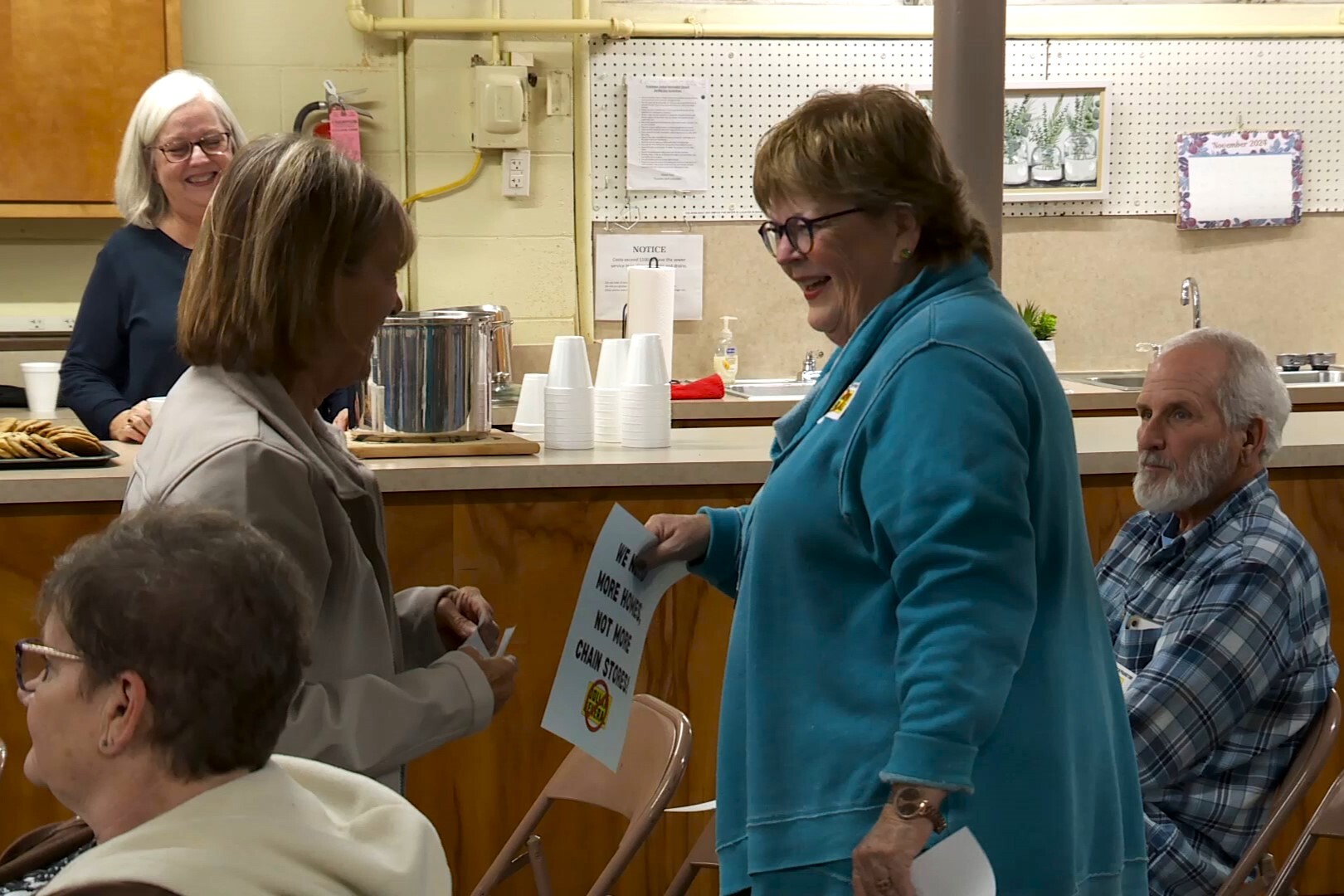
Within a week of the signs going viral locally, “Keep the Prairie in Prairieton Group” was formed.
Their issue? They simply didn’t want another Dollar General store in their area.
“Most of us go to Dollar General once a week, twice a week, but we have one Dollar General four miles up the road at Spring Hill on 63 and we have one Dollar General four miles east on US-41,” Morgan said.
They had other qualms; traffic, the fact that alcohol would be sold next to the church and wanting to see the land used for different purposes.
“There's other things that we could use,” she said. “That land could be subdivided into residences. We would much prefer to have homes and families. We need houses.”
The plan commission recommended the rezone, but Vigo County Commissioners wanted to give residents time to have their concerns answered by a Dollar General representative.
So, a few weeks later, residents gathered in the church basement expecting to speak to a store representative. Instead, the building developer and his attorney spoke, and were unable to answer many of their questions.
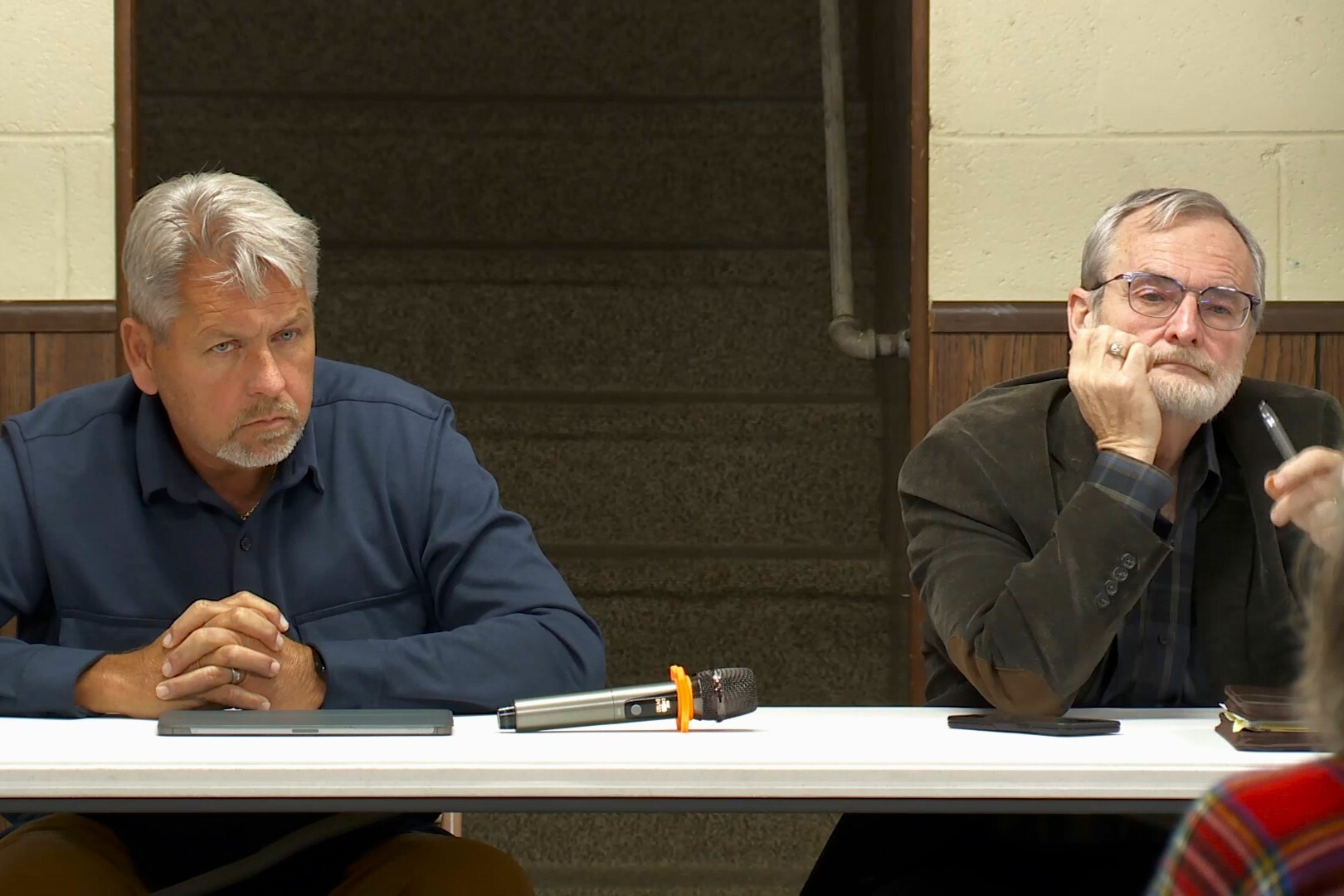
Among those questions: How often will dumpsters be emptied?
“I’d have to look into that, I can’t say one way or the other right now,” said Charles Overton, a partner with the Overland Group, a commercial real estate developer.
Would it be possible to for Dollar General to contribute to a planned pollinator field in Prairieton?
“That would be a corporate question, I can't answer that question,” Overton reiterated.
Or the big question, why is Dollar General so interested in opening a store so close to other locations?
“I really can't answer that question because I don’t control their marketing studies,” he said.
The following week, the Vigo County Commissioners met with the protestors and a lawyer representing the Overland group.
After “Keep the Prairie in Prairieton” presented a 19-and-a-half-foot paper scroll with the names of almost 500 people who signed a petition against the rezoning, and with the developer’s lawyer still unable to answer questions, the commissioners voted against the rezoning request.
“That's probably one of these folks’ issues and one of my issues — that there is no Dollar General contact,” said Vigo County Commissioner Mark Clinkenbeard. “This is a pretty important issue to the people in this community. And I think not having one Dollar General representative here, you know, speaks a lot.”
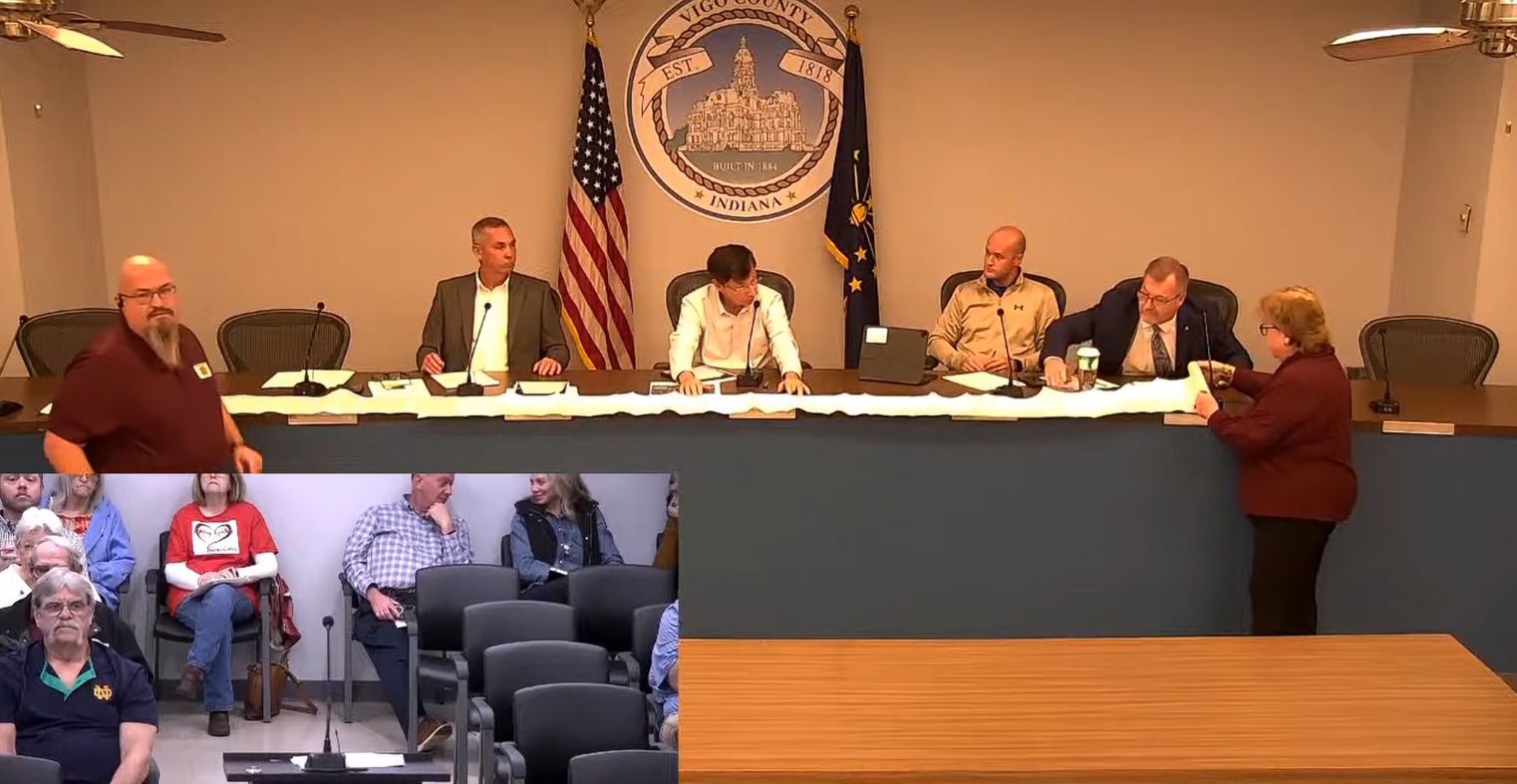
Events such as this aren’t uncommon in Indiana, though it rarely happens as efficiently as it did in Prairieton.
In Monroe County in 2022, commissioners denied a property rezone for a new Dollar General on Sample Road after it bounced around the plan commission for six months.
County Commissioner Penny Githens said that it wasn’t worth all the effort to bring in another national chain store instead of something that could provide more fresh food.
“If we were addressing a food desert issue, then this should be a food emporium of some sort,” she said.
Kennedy Smith, a senior researcher with the Institute for Local Self Reliance, said research from UCLA and University of Toronto found that dollar stores often have a negative impact on food in rural communities.
“They looked at something like 800 dollar stores and found that if you have three or more dollar stores within a two-mile radius, a locally owned grocery store will almost certainly go out of business,” Smith said.
Read more: Lawmakers 'cautiously optimistic' as forecast shows minimal revenue growth for new state budget
The Institute for Local Self Reliance named eight other cities and towns in Indiana that in the last few years have denied new stores from being built for various reasons. Smith says this shows more areas have been emboldened to deny new Dollar General locations.
“I think it's because people have more experience with them, more exposure to them, and so they've seen, you know, 'Oh, yeah, these things do generate a lot of traffic, and they do kind of attract crime, and they do present some safety hazards,’” she said.
A year ago Hope, Indiana, denied rezoning for a new Dollar General/Dollar Tree combo store. Residents cited safety concerns and other nearby store locations.
In May of 2023, Edinburgh, Indiana denied the building of a Dollar General Market location, citing road safety.
At all of those meetings, Dollar General did not have a representative present to address concerns.
Smith said Dollar General doesn’t own the buildings they operate in. Instead, the company leases from a commercial developer like The Overland Group.
“They're committed to signing a long-term lease with this developer, they really have no involvement in the community,” she said. “And people think Dollar General should be here answering questions. The Dollar General basically is putting some distance between themselves and the community by having the developer be the one who really is the flashpoint for all of this.”
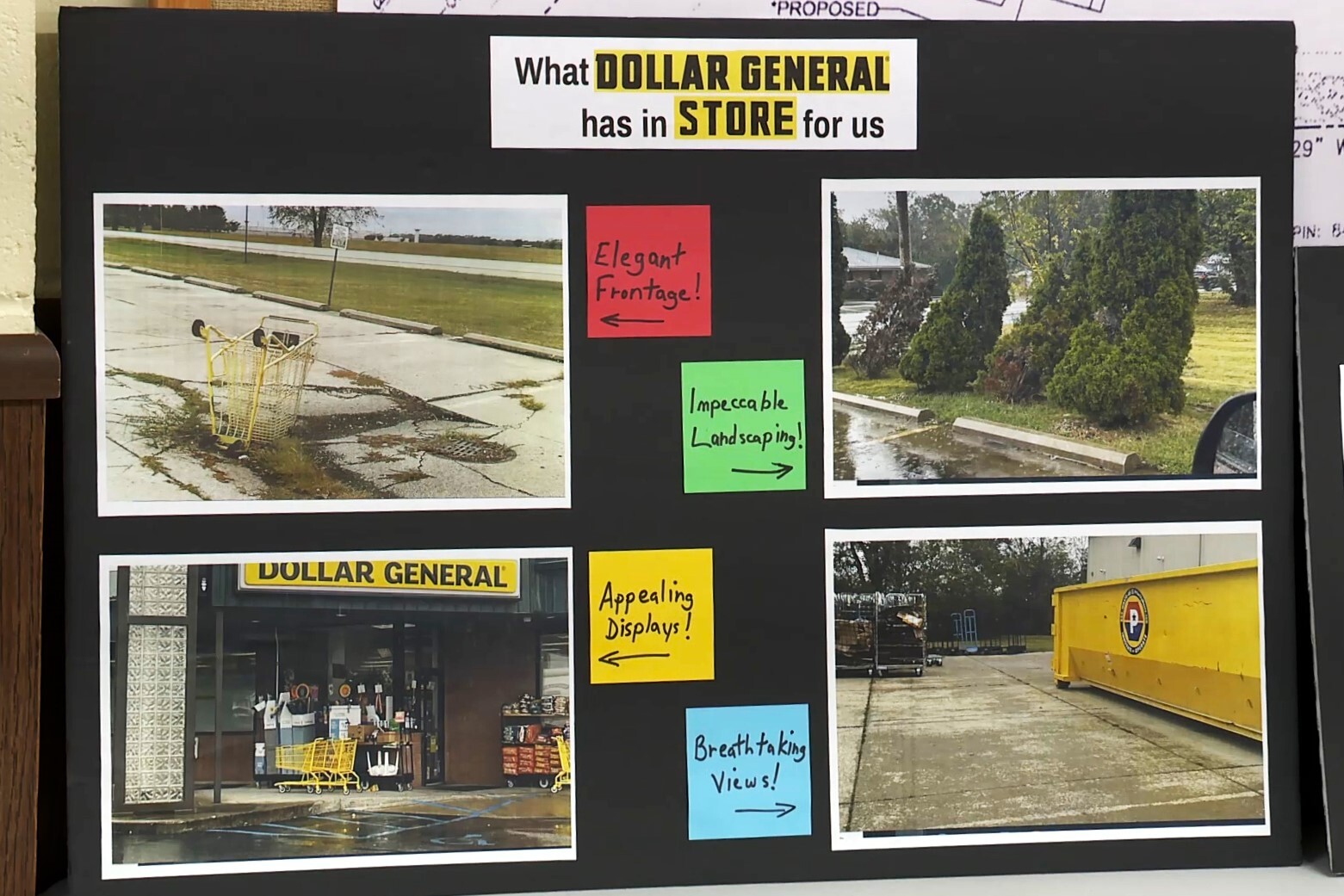
Dollar General did not respond to numerous questions from WFIU/WTIU News, except how it chooses where to build new stores.
“In selecting store sites, we take a number of factors into consideration, carefully evaluating each potential new store location to ensure we can continue to meet our customers’ price, value and selection needs,” the company said in a statement.
Smith said some communities nationally created ordinances preventing new dollar stores from being built.
“There are communities that even require dollar stores to submit their shelf plan to the city planning office to say, ‘we want to see exactly how much lettuce and exactly how many carrots, and exactly what you're offering here,’” she said.
Smith hopes that as more small towns speak out, there will be more opportunities to build self-sustaining economies not reliant on corporations.
“In almost every community that fights these, it is hundreds of people who are out opposing them,” she said. “And I think that alone sends a message. I don't know why Dollar General isn't hearing it, that a lot of communities just don't want you there.”
Read more: More Marion County schools added to IU Indianapolis seamless admissions









